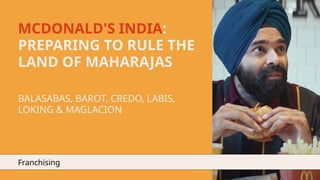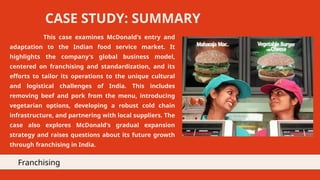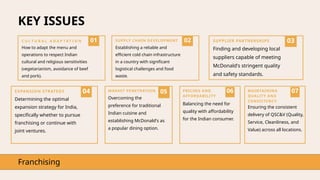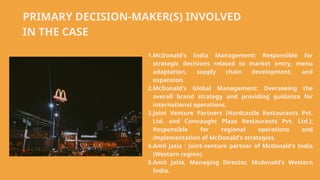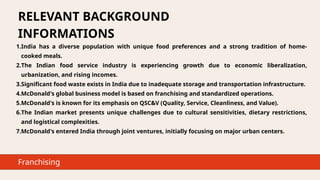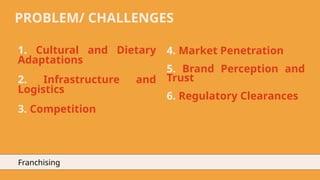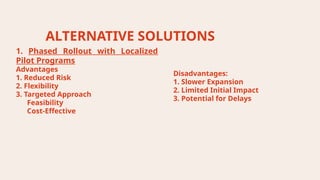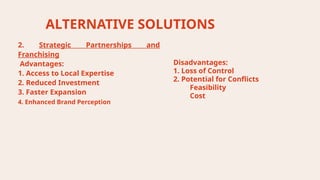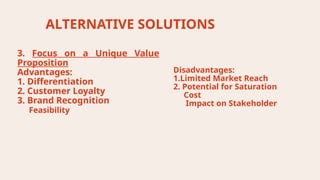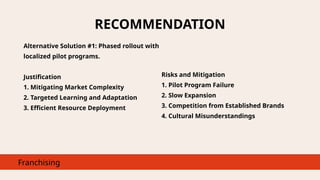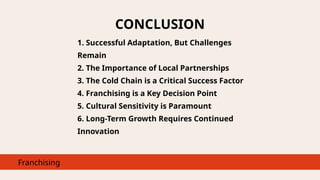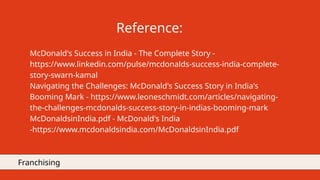McDonalds-India-Preparing-to-Rule-the-Land-of-Maharajas_20250223_150202_0000.pptx
- 1. MCDONALD'S INDIA: PREPARING TO RULE THE LAND OF MAHARAJAS BALASABAS, BAROT, CREDO, LABIS, LOKING & MAGLACION Franchising
- 2. This case examines McDonald's entry and adaptation to the Indian food service market. It highlights the company's global business model, centered on franchising and standardization, and its efforts to tailor its operations to the unique cultural and logistical challenges of India. This includes removing beef and pork from the menu, introducing vegetarian options, developing a robust cold chain infrastructure, and partnering with local suppliers. The case also explores McDonald's gradual expansion strategy and raises questions about its future growth through franchising in India. CASE STUDY: SUMMARY Franchising
- 3. KEY ISSUES Franchising 01 C U L T U R A L A D A P T A T I O N How to adapt the menu and operations to respect Indian cultural and religious sensitivities (vegetarianism, avoidance of beef and pork). 02 SUPPLY CHAIN DEVELOPMENT Establishing a reliable and efficient cold chain infrastructure in a country with significant logistical challenges and food waste. 03 SUPPLIER PARTNERSHIPS Finding and developing local suppliers capable of meeting McDonald's stringent quality and safety standards. 04 EXPANSION STRATEGY Determining the optimal expansion strategy for India, specifically whether to pursue franchising or continue with joint ventures. 05 MARKET PENETRATION Overcoming the preference for traditional Indian cuisine and establishing McDonald's as a popular dining option. 06 PRICING AND AFFORDABILITY Balancing the need for quality with affordability for the Indian consumer. 07 MAINTAINING QUALITY AND CONSISTENCY Ensuring the consistent delivery of QSC&V (Quality, Service, Cleanliness, and Value) across all locations.
- 4. PRIMARY DECISION-MAKER(S) INVOLVED IN THE CASE 1.McDonald's India Management: Responsible for strategic decisions related to market entry, menu adaptation, supply chain development, and expansion. 2.McDonald's Global Management: Overseeing the overall brand strategy and providing guidance for international operations. 3.Joint Venture Partners (Hardcastle Restaurants Pvt. Ltd. and Connaught Plaza Restaurants Pvt. Ltd.): Responsible for regional operations and implementation of McDonald's strategies. 4.Amil Jatia : Joint-venture partner of Mcdonald's India (Western region). 5.Amit Jatia, Managing Director, Mcdonald's Western India.
- 5. RELEVANT BACKGROUND INFORMATIONS 1.India has a diverse population with unique food preferences and a strong tradition of home- cooked meals. 2.The Indian food service industry is experiencing growth due to economic liberalization, urbanization, and rising incomes. 3.Significant food waste exists in India due to inadequate storage and transportation infrastructure. 4.McDonald's global business model is based on franchising and standardized operations. 5.McDonald's is known for its emphasis on QSC&V (Quality, Service, Cleanliness, and Value). 6.The Indian market presents unique challenges due to cultural sensitivities, dietary restrictions, and logistical complexities. 7.McDonald's entered India through joint ventures, initially focusing on major urban centers. Franchising
- 6. PROBLEM/ CHALLENGES 1. Cultural and Dietary Adaptations 2. Infrastructure and Logistics 3. Competition Franchising 4. Market Penetration 5. Brand Perception and Trust 6. Regulatory Clearances
- 7. ALTERNATIVE SOLUTIONS Disadvantages: 1. Slower Expansion 2. Limited Initial Impact 3. Potential for Delays 1. Phased Rollout with Localized Pilot Programs Advantages 1. Reduced Risk 2. Flexibility 3. Targeted Approach Feasibility Cost-Effective
- 8. ALTERNATIVE SOLUTIONS Disadvantages: 1. Loss of Control 2. Potential for Conflicts Feasibility Cost 2. Strategic Partnerships and Franchising Advantages: 1. Access to Local Expertise 2. Reduced Investment 3. Faster Expansion 4. Enhanced Brand Perception
- 9. ALTERNATIVE SOLUTIONS Disadvantages: 1.Limited Market Reach 2. Potential for Saturation Cost Impact on Stakeholder 3. Focus on a Unique Value Proposition Advantages: 1. Differentiation 2. Customer Loyalty 3. Brand Recognition Feasibility
- 10. RECOMMENDATION Alternative Solution #1: Phased rollout with localized pilot programs. Justification 1. Mitigating Market Complexity 2. Targeted Learning and Adaptation 3. Efficient Resource Deployment Franchising Risks and Mitigation 1. Pilot Program Failure 2. Slow Expansion 3. Competition from Established Brands 4. Cultural Misunderstandings
- 11. CONCLUSION Franchising 1. Successful Adaptation, But Challenges Remain 2. The Importance of Local Partnerships 3. The Cold Chain is a Critical Success Factor 4. Franchising is a Key Decision Point 5. Cultural Sensitivity is Paramount 6. Long-Term Growth Requires Continued Innovation
- 12. Franchising McDonald's Success in India - The Complete Story - https://www.linkedin.com/pulse/mcdonalds-success-india-complete- story-swarn-kamal Navigating the Challenges: McDonald's Success Story in India's Booming Mark - https://www.leoneschmidt.com/articles/navigating- the-challenges-mcdonalds-success-story-in-indias-booming-mark McDonaldsinIndia.pdf - McDonald's India -https://www.mcdonaldsindia.com/McDonaldsinIndia.pdf Reference:
